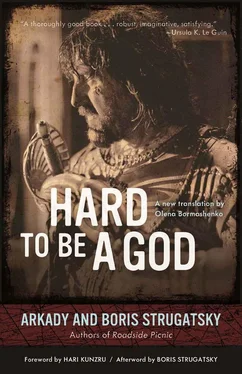03/17/1963—AS: …the entire program which you outlined can be completed in five days. But first I’d like to tell you, my pale flabby brother, that I’m for a light kind of thing—I’m talking about Seventh Heaven. So women would cry, walls would laugh, and five hundred villains would shout, “Get him! Get him!”—and they wouldn’t be able to do a thing with one communist.
The last phrase is a slightly modified quotation from our beloved Dumas trilogy, and we’re apparently talking about the vein in which to write the new novel.
I had my own views on that subject. What they were exactly can be guessed from my brother’s comments in this next excerpt:
03/22/1963:… About The Observer (that’s what I’ve renamed Seventh Heaven). If you’re interested in a rush of tumultuous life, then you will have a full opportunity to spill your guts in Days of Kraken and The Magicians. But what I’d like to do is to write a novel about abstract nobility, honor, and joy, like Dumas. And don’t you dare argue. Just one story without modern problems in naked form. I’m begging on my knees, bastard! My sword, my sword! Cardinals! Port taverns!
This entire exchange was happening against a very interesting political backdrop. In the middle of December 1962 (I don’t remember the exact date), Nikita Khrushchev saw an exhibition of contemporary art at the Moscow Manege. Goaded (according to rumors) by Leonid Ilichev, then the head of the ideological commission of the Central Committee, the furious chief—a renowned expert in the areas of painting and all fine arts, you understand—ran through the exhibition halls (again according to rumors), shouting, “Assholes! Who do you work for? Whose bread do you eat? Motherfuckers! Who did you daub this for, daubers?” He stamped his feet, blood rushed to his face, and he showered spittle for two yards around him. (This was precisely the origin of the famous anecdote in which Nikita the Corn Man, staring at a certain ugly image in a frame, yells in a voice not his own, “And what’s this butt with ears?” And is answered with fear and trembling: “That’s a mirror, Nikita Sergeyevich.”)
All mass media without exception immediately descended on abstraction and formalism in art, as if for the last ten years they had been preparing just for this, collecting materials and only waiting for permission to speak about this burning topic.
And that was only the beginning. “On December 17, at the Reception House on Lenin Hills, there was a meeting of the leaders of the Communist Party and the Soviet government with the writers and artists.” Brezhnev, Voronov, Kirilenko, Kozlov, Kosygin, Mikoyan, Polyansky, Suslov, Khrushchev, and various other prominent plainclothes literary and art critics gathered in one place in order to “make comments and suggestions on the development of literature and art.”
Observations were made. The press was no longer roaring, it was literally howling: THERE CAN BE No COMPROMISE; THE RESPONSIBILITY OF THE ARTIST; THE LIGHT OF CLARITY; THE WORRY THAT GIVES US WINGS; ART AND PSEUDO-ART; TOGETHER WITH THE PEOPLE; OUR STRENGTH AND WEAPON; THIS IS OUR PARTY, THIS IS OUR ART!; DOING IT LENIN’S WAY; ALIEN VOICES… It was as if an ancient abscess had burst. Bad blood and pus overflowed from the newspaper pages. All those who during the years of the “thaw” had gone quiet (it seemed to us), who had flattened their ears and only looked around like hunted animals, as if waiting for the inconceivable, impossible, improbable retribution for the past; all these monstrous offspring of Stalinism and Beria-ism, who were up to the elbows in the blood of innocent victims, all these covert and overt informers, ideological operators and moronic do-gooders—they all instantly sprang out of their hiding places; they all turned out to be right on the spot, energetic, agile, able hyenas of the pen, alligators of the typewriter. Go to it!
But that wasn’t all. On March 7, 1963, the “exchange of opinions on literature and art” was continued. The experts were joined by a number of other connoisseurs of the fine arts—Podgorny, Grishin, and Mazurov. The exchange of opinions lasted two days. The newspaper howls intensified, even though you’d think that was impossible. THE GREATNESS OF TRUE ART; DOING IT LENIN’S WAY! (seen before, but now with an exclamation mark); THE PHILOSOPHY OF WESTERN ART: EMPTINESS, DECAY, DEATH; HIGH IDEALS AND ARTISTIC SKILL: THE GREAT POWER OF SOVIET LITERATURE AND ART; THERE’S NO “THIRD” IDEOLOGY!; CREATING IN THE NAME OF COMMUNISM; GLORIFYING, PRAISING, CULTIVATING HEROISM; HOLD STEADY! (the number of exclamation marks is definitely increasing); PURSUITS IN POETRY, TRUE AND FALSE; LOOKING AHEAD!
The sun is out, but no warmth—no matter.
There’s a flood, flowing floodwater.
All cattle join in joyous song,
A thaw has come, but it’s all wrong!
That was Yuliy Kim instantly responding—as always, poisonously and with perfect precision:
Flood water, spring water,
Turbid, wanton, dissolute water…
Grab your nets and toss them quick,
Brothers, you will have your pick!
Go to it!
All the record players in all the intellectuals’ kitchens were ringing with his verses, performed in a deliberately cloying and even tender voice.
Oh, what a time! A dream of a time!
How the Kochets crow and crow!
The kind of singing I hear outside,
Even the “October” never did know!
“Kochets” doubtlessly refers here to the colleagues and associates of V. Kochetov, the then-chief editor of the pro-Stalin journal October, an inveterate Stalinist, anti-Semite, and reactionary who was even occasionally reprimanded by the authorities in order to maintain decorum “in the eyes of the international labor movement.”
They started with the modern artists: Falk, Sidur, Ernst Neizvestny, and then, before anyone knew it, they went after Ilya Ehrenburg, Viktor Nekrasov, Andrei Voznesensky, Alexander Yashin, and the movie I Am Twenty. And of course, anyone who felt like it walked all over Aksenov, Yevtushenko, Sosnora, Ahmadulina, and even—but politely, bowing the whole time!—Solzhenitsyn. (Solzhenitsyn still remained in favor with the Man. But the rest of the entourage, how they all hated and feared him! In favor with the king, out of favor with his huntsmen.)
In good time, the purulent wave reached even our outskirts, our quiet science fiction shop. On March 26, 1963, there was an expanded meeting of the science fiction and adventure section of the Moscow Writers’ Organization. The following people were present: Georgiy Tushkan (the chairman of the section, the author of several adventure stories and the science fiction novel Black Whirlwind), A. P. Kazantsev, Georgy Gurevich, Anatoly Dneprov, Roman Kim (the author of the stories “The Notebook Found in Suncheon,”
“The Girl from Hiroshima,” and “Burn After Reading”), Sergei Zemaitis (the head of the science fiction editorship at the Young Guard publishing house), Yevgeny Pavlovich Brandis, and many others. Here’s a characteristic passage from Arkady’s detailed report about it:
And that’s when the worst began. Kazantsev spoke. The first half of his speech was entirely devoted to Altov and Zhuravleva. The second half I didn’t listen to, because I was agonizing, not knowing what to do. Here are the theses of what he was saying. The Altov direction in science fiction had, thank God, never gotten developed. And that’s not surprising, because Soviet science fiction writers as a whole are people of principle. At the 1958 meeting, Altov accused “Dneprov and I” of clinging to a single topic which everyone was sick of: the collision of two worlds. No, Comrade Altov, we are not sick of this topic, and you are an unprincipled person. (The stenographers were frantically recording everything. In general, everything was recorded in shorthand.) In the Star River Test, Altov takes a stand against Einstein’s postulate about the speed of light. But in the ’30s, fascists tortured and persecuted Einstein for precisely this postulate. All of Altov’s writing in one way or another plays into the hands of fascism. (The stenographers keep recording! Don’t worry, I’m not exaggerating, I thought I must be dreaming myself.) Not only that, but all of Altov’s writing is so far removed from life, so empty and devoid of vital content, that we can safely call him an abstract literary artist, and therefore a dauber and a slanderer, and so on.
Читать дальше












